|
|
|
Sort Order |
|
|
|
Items / Page
|
|
|
|
|
|
|
| Srl | Item |
| 1 |
ID:
087874
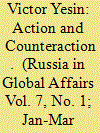

|
|
|
|
|
| Publication |
2009.
|
| Summary/Abstract |
Washington's plan to deploy a European segment of its missile defence system is a most sensitive issue and a major pet peeve of Russia - U.S. relations. Many observers agree that the ability of the sides to find a compromise solution to this problem would be indicative of the prospects for bilateral ties in the years to come.
PASSIONS OVER THE THIRD POSITION AREA
The planned third position area of a U.S. global missile defence system would include silos with interceptor missiles in Poland (the Ustka military range near the town of Slupsk in Pomeranian Voivodeship) and a missile defence radar in the Czech Republic (the Brdy military area near Jince, 60 km south-west of Prague). The first and second position areas of the ground-based echelon of the U.S. strategic missile defence system are deployed on the territory of the United States - in Fort Greely, Alaska and at Vandenberg Air Force Base, California, respectively.
The decision made by Washington in late 2005 to deploy a third position area near Russia's western border was taken by Moscow as a threat to its national security. (For more on this subject, see "Missile Defence Challenges" by Pavel Zolotarev in Russia in Global Affairs, N 3, July-September 2008.) To allay Moscow's fears, the George W. Bush administration made several attempts between 2006 and 2008 to convince the Russian leadership that the third position area was not directed against Russia.
|
|
|
|
|
|
|
|
|
|
|
|
|
|
|
|
| 2 |
ID:
148695
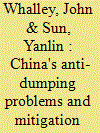

|
|
|
|
|
| Summary/Abstract |
The present paper explores the opportunities for China's regional trade agreement (RTA) initiatives to mitigate its anti-dumping problems. The paper highlights the severity and discriminatory nature of China's anti-dumping problems. The high concentration of the share of anti-dumping actions taken by the top 4 and top 8 anti-dumping initiators is noted. Our finding of a weak effect of existing RTAs on mitigating China's anti-dumping problems supports the argument that China could become more active in mitigating anti-dumping problems through RTA negotiations. An RTA can include a higher level of openness in exchange for an improvement in regional anti-dumping provisions. Case studies on RTAs involving the EU, the USA and India offer some precedents for offering inducements and modifying regional anti-dumping provisions. The approaches for China may lie in obtaining market economy status from intensive anti-dumping initiators at RTA levels and also altering regional anti-dumping provisions that could be put in place in exchange for some potential concessions.
|
|
|
|
|
|
|
|
|
|
|
|
|
|
|
|
| 3 |
ID:
159749


|
|
|
|
|
| Summary/Abstract |
The literature on environmental peacemaking argues that cooperation in the face of shared environmental challenges can facilitate further cooperation, trust building, and eventually peace between states in conflict. Empirical research on environmental peacemaking, predominantly conducted in the form of single case studies, has so far been inconclusive. This article uses a cross-case, multimethod research design to test the environmental peacemaking proposition. More specifically, it argues that the conclusion of a cooperative environmental agreement can have a positive impact on reconciliation between rival states. Based on a new dataset on international rivalry termination, transboundary protected areas, and international freshwater agreements, this article first conducts a statistical analysis and a qualitative comparative analysis (QCA). The results are then verified and refined by six case studies. Triangulation of findings from the three studies suggests that the conclusion of a cooperative environmental agreement facilitates reconciliation in international rivalries. But this effect is contingent on a number of scope conditions, such as high environmental attention, internal political stability, wider patterns or traditions of environmental cooperation, and already ongoing processes of reconciliation. Still, the findings imply that environmental challenges do not only affect peace and security in a negative way. Addressing them jointly also opens opportunities for peacemaking and peacebuilding between states.
|
|
|
|
|
|
|
|
|
|
|
|
|
|
|
|
| 4 |
ID:
137838
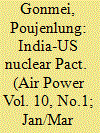

|
|
|
| 5 |
ID:
133147


|
|
|
|
|
| Publication |
2014.
|
| Summary/Abstract |
Are Directive Strategies in international disputes the most effective mediation method for obtaining durable peace? A standard statistical analysis shows no effect of Directive Strategies on settlement durability. This result however, is misleading, failing to take selection and indirect effects into account. In this article, I identify when selection and process effects reinforce or oppose each other. Directive Strategies have opposing negative selection and positive process effects, which can distort inferences about their influence. Strategies' direct and indirect effects are also examined. Directive Strategies are more likely to lead to Full Settlements - the most comprehensive form of agreement, which improve the settlement durability (an indirect effect). However, Directive Strategies are used in more intractable disputes that result in fragile settlements (a direct effect). A statistical analysis of international disputes that takes these conflicting dynamics into account demonstrates the efficacy of Directive Mediation Strategies in producing durable agreements.
|
|
|
|
|
|
|
|
|
|
|
|
|
|
|
|
| 6 |
ID:
148684


|
|
|
|
|
| Summary/Abstract |
In March 2016, the European Union and Turkey reached an agreement seeking to end the refugee flows from Turkey to Greece. This agreement is the outcome of a bargaining process in which Turkey gained considerable leverage from its position as a ‘gatekeeper’ situated between Syria and an increasingly ‘immigration-averse’ and securitised EU. More importantly, this bargaining process might have broader implications for the EU and its relations with its periphery, since Turkey has progressively reversed the asymmetries of power by demonstrating the indispensability of its continued commitment to act as gatekeeper vis-à-vis an increasingly fragmented and anxious EU.
|
|
|
|
|
|
|
|
|
|
|
|
|
|
|
|
| 7 |
ID:
137637


|
|
|
|
|
| Summary/Abstract |
There are a wide range of roles and effects that justice can have in negotiations at the international level. It can be a source of conflict and trigger for negotiation, a referent guiding negotiations, a subject of negotiation, a tool to reach effective agreements, and a tactical tool. Justice can assume any or several of these roles in any one negotiation. This article looks at justice as a lens through which to understand what drives negotiation processes and explains different results in the international arena.
|
|
|
|
|
|
|
|
|
|
|
|
|
|
|
|
| 8 |
ID:
100042
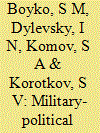

|
|
|
| 9 |
ID:
086489
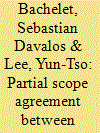

|
|
|
|
|
| Publication |
2009.
|
| Summary/Abstract |
The main objectives of the Partial Scope Agreement between Chile and India are to promote, by means of trade expansion, the harmonious development of economic relations between Chile and India, provide conditions for fair competitiveness in Chilean-Indian trade, take into consideration the principle of reciprocity in the implementation of the agreement and thus, by means of the removal of obstacles to trade, contribute to the development and harmonious expansion of international trade.
|
|
|
|
|
|
|
|
|
|
|
|
|
|
|
|
| 10 |
ID:
091762
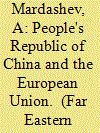

|
|
|
|
|
| Publication |
2009.
|
| Summary/Abstract |
The article examines the process of establishing a multilateral strategic partnership between the People's Republic of China and the European Union and gets to the heart of the main problems that stand in the way of Beijing and Brussels drawing closer in the future. The author concludes that resolving existing issues would be conducive to rapid completion of the negotiations on a new comprehensive agreement would, along with the creation of conditions favorable to the development of bilateral relations in the 21st century.
|
|
|
|
|
|
|
|
|
|
|
|
|
|
|
|
| 11 |
ID:
166002


|
|
|
|
|
| Summary/Abstract |
In this article, we argue that because governments fear that accepting mediation and reaching agreements with opponents may signal weakness to other potential challengers, civil war governments tend to resist mediation as a means of demonstrating their resolve. Building on current theories of reputation in civil war, we argue that the threat of future challenges from other groups is likely to be particularly acute in states with multiple ethnic groups, especially states with high levels of ethnic exclusion. We therefore expect that civil wars in these states will be less likely to see mediation and to produce agreements when they do. By examining all instances of mediation in intrastate conflict from 1990 to 2008, we test this argument empirically and find that mediation is more likely to emerge in civil wars where there are a large number of ethnic groups, but is less likely to occur when many of those ethnic groups are excluded from the political process. Once mediation is underway, however, it is less likely to yield a negotiated settlement when there are a large number of ethnic groups, but more likely to end in a negotiated settlement when many of the ethnic groups are excluded from the political process.
|
|
|
|
|
|
|
|
|
|
|
|
|
|
|
|
| 12 |
ID:
036298
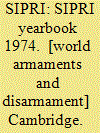

|
|
|
|
|
| Publication |
Cambridge, MIT Press, 1974.
|
| Description |
xviii, 526p.hbk
|
| Series |
SIPRI Yearbooks 1974
|
| Standard Number |
0262191296
|
|
|
|
|
|
|
|
|
|
|
|
Copies: C:1/I:0,R:0,Q:0
Circulation
| Accession# | Call# | Current Location | Status | Policy | Location |
| 013251 | 327.17405/SIP 013251 | Main | On Shelf | General | |
|
|
|
|
| 13 |
ID:
074911
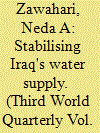

|
|
|
|
|
| Publication |
2006.
|
| Summary/Abstract |
The future stability of the young and relatively weak Iraqi government rests on its ability to provide basic public goods—water, food, and electricity—to its populace, which is related directly to stabilising the quality and quantity of its available water supply. Since 98% of Iraq's water comes from the Euphrates and Tigris rivers, both of which originate and flow through several countries before entering Iraq, stabilising the water supply becomes an international issue. In other words, to stabilise Iraq's water supply, there needs to be a comprehensive agreement between the states sharing the Euphrates and Tigris. As this article argues, an agreement is possible when states have an interest in co-operation, a neutral mediator facilitates the negotiations, and a river commission is established to maintain long-term co-operation. Due to important changes today the states sharing the Euphrates and Tigris rivers confront favourable conditions that can lead to an agreement.
|
|
|
|
|
|
|
|
|
|
|
|
|
|
|
|
|
|
|
|
|